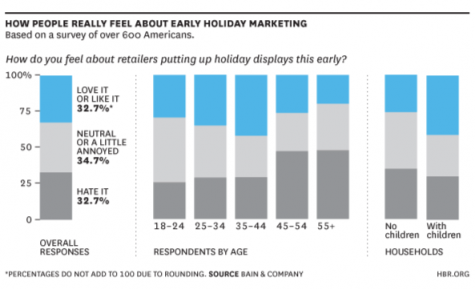’Ad Enough?

Shoppers walk past a Christmas advertisement outside Sears Friday, Nov. 27, 2009, in downtown Chicago as consumers around the nation crowded stores and malls on Black Friday, the traditional start of the holiday shopping season. (AP Photo/Charles Rex Arbogast)
Around the holidays, bells aren’t the only kind of jingles to be heard.
In the last few months of the year, holiday advertisements inundate TV, radio, and social media. Not only do these holiday ads already saturate society, but their presence keeps growing, and there are differing viewpoints on their impact.
In recent years, holiday ads and the money spent on them has increased. In 2014, Nielsen Entertainment reported $2.5 billion being spent on holiday advertising, half a billion more than in 2009. Certain types of products are advertised more than others. For example, in 2013, around $400,000 was spent on advertising technology alone—which was a 26% increase from four years before that.
The amount of money spent on just Black Friday ads is astounding. Kantar Media reported that in 2013, eleven of the top retailers in the country together spent over $250 million on TV ads alone. Even so, the results of that year varied. Wal-Mart spent $57 million on TV commercials, but yielded the lowest amount spent per visitor of the retailers in the group. In contrast, Sears had the highest amount spent per visitor in the group, and only spent $26 million on ads.
The power of holiday ads still varies in 2016: people disagree on whether or not the influx of ads in the holiday season actually works.
“I don’t think holiday marketing is usually effective,” said senior Henry Dikeman. “There are so many ads out there that people don’t really take notice [of them] anymore.”
Junior Keren Krisnik disagreed: “They’re extremely effective. [Holiday ads are] catchy and cute, which is memorable to the viewer or listener. [They] bring in more customers.”
Despite their effectiveness, Krisnik noted, “I find it pretty ridiculous that holiday ads can start as early as November 1st, just to get as many people as possible to hear about ‘amazing deals’ that end up usually being not so great.” While a lot of the population agrees, many don’t mind. In fact, The Atlantic reported a survey where a third of the people said that early holiday ads “put them in a good mood.”

Retailers have reasons for the early commercials. Nielsen Entertainment reported that last year, 36% of Americans began their holiday shopping by the end of September. Market research concurs: according to Ask Your Target Market (AYTM), a market research group, in November 2015, “47% of US Internet users said holiday promotions before November 4th were effective in getting them to make purchases.”
Overall, many Americans still don’t like the ads even in the appropriate season. “[Even though they can be effective] I hate holiday ads,” stated Krisnik. “They try to use personable interests to get people to buy stuff they don’t really need.”
Although people do disagree on the effectiveness of increased holiday ads in general, many on both sides argue that they don’t often influence their own shopping. “[Holiday ads] don’t really affect what I buy,” stated Krisnik. “When I do buy holiday gifts, I go for more what the person would want, but also look at sales to see what’d be a better deal.”
Likewise, Dikeman stated, “[Holiday] marketing only really impacts what I buy when there are sales. Sometimes holiday shopping is hard to make affordable, so sales help.”
While some people may be more susceptible to holiday ads than others, it’s hard to deny that they do affect the shopping of many Americans. In a world infused with commercials during the holiday season, it is best to keep in mind one’s purpose when holiday shopping: to buy something for someone who matters to you.






